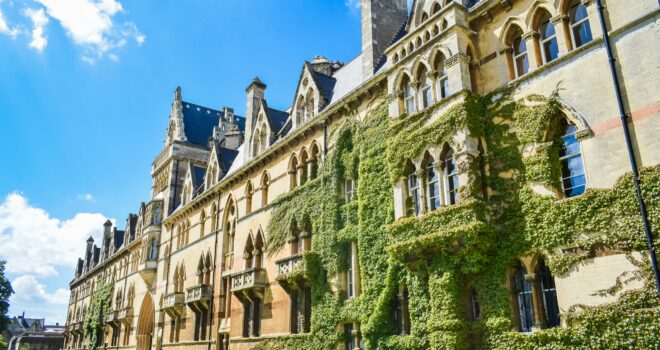It’s Time to Return to Authentic Universities
Around this time of year, young college freshmen are scurrying about their new campuses with the hope of finding their niche within the school’s community. Perhaps for the first time in their lives, they have left all that they have ever known. They’ve left behind fathers, mothers, siblings, other relatives, and friends. They’ve left behind […]



Around this time of year, young college freshmen are scurrying about their new campuses with the hope of finding their niche within the school’s community. Perhaps for the first time in their lives, they have left all that they have ever known. They’ve left behind fathers, mothers, siblings, other relatives, and friends. They’ve left behind the nostalgia of their hometowns. No longer are they travailing those roads so familiar to them. Now, they have new ones to discover.
At some point, however, most young men and women find their footing. They regain their balance after the jolt of drastic change. They begin to make friends, find their groups, and join their clubs. They begin receiving invitations and start accepting them. They broaden their social horizons and make friends from faraway places. If the university which they attend is a solidly Catholic one, they perhaps find genuine friendship for the first time in their lives. They breathe deep sighs of relief after having prayed for these friendships which they desired during perhaps less-than-Christian previous school experiences. At last, they feel that life has begun.
Truth to tell, we moderns have altogether lost sight of the true purpose and end of university life. After having tried to raise them Catholic, we send our children away to secular campuses in the hope that they’ll learn something and find good friends. Some might even surrender to the fact that their children will spend their college days doing things that they would rather not know about. It’s laughed off as “just what goes on at college.” Yet, we all know deep down that the college years ought to consist of bigger and better things. The university must necessarily be ordered to something other than such things. Most will accept that at least, yet many more are lost as to what university life ought to be. What kind of college experience should we be striving to lead our high school graduates toward?
After having graduated high school myself, I decided to attend an outstandingly Catholic Newman Guide university in Southwest Florida. (Go Gyrenes!) I arrived on campus as a freshman as the only new student from my high school and my hometown. I knew no one besides a few distant connections. Completely ignorant of the adventure that I was just beginning, I went about the ordinary freshman experience described above. Indeed, there came that joyous day when I had found myself in the midst of the most extraordinary young men and women—from freshmen to seniors. I found myself being known by name. Priests, professors, friends, and families of friends formed an authentic Catholic community in which I then took root and grew for the next four years.
Truthfully, as I look back on my time at university, I find it difficult to articulate what exactly I experienced. This, in part, is because so much occurred during those hallowed years, but more so because my university experience was once of intense growth, friendship, Goodness, and Truth. I will attempt in brief to point at what I believe university ought to be for every young Catholic.
The university is a place in which students undergo an intense spiritual, intellectual, and human formation which takes place before the Eucharistic Face of Jesus Christ as well as in the midst of genuine mentorship and friendship. It is a place of leisure, in the classical sense of the word. In an authentic college experience, the student is immersed into the Great Tradition of the West. He delves deeply into a rich study of philosophy and theology. He forms relationships with priests and professors who diffuse wisdom for college life and the years beyond. He lives in virtuous friendship with other young men and women who are pursuing all that is True and Good and Beautiful.
Most importantly of all, he does everything before the gaze of Christ in the Eucharist—before the Eucharistic Face of Jesus. He lives in communion with His Lord through a deep sacramental and prayer life. He experiences within himself the Lord’s beautiful work of Redemption, the work of grace upon the human soul. In short, the university is a place in which the student lives and does all in the Lord.
If the college years are lived as they ought to be, the student will graduate feeling as though he has just completed one of the great adventures of his Christian life—an adventure which the Lord Jesus called him to embark on, struggle through, and reap great fruits from. He will feel himself inestimably grateful for the place and people in the midst of which he has spent the most formative years of his life. He looks back at the past four years with a deep love, perhaps even a sadness at being called elsewhere and into the world beyond, yet he knows himself prepared by the formation he has received. Indeed, he leaves with a strong confidence in the grace and mercies of his Lord who, during the last few years, has sweetly and gently taught him to walk by faith.
This kind of college experience is one which is readily available to anyone who wishes to benefit from it. I would venture so far as to say that Catholic families have a duty to encourage and lead their children in the direction of authentic universities (which undoubtedly means authentically Catholic universities—see the Newman Guide for a list of them).
It is time to start leading our children away from the godless wastelands which our modern secular universities have become. It is not difficult to see that genuine collegiate education no longer exists in secular universities. Therefore, as loving families and as fellow members of the larger Mystical Body of Christ, we ought to encourage all of our youth to receive such a formation—indeed, a formation for a happy life here below and an eternally happy one hereafter.
Photo by Darya Tryfanava on Unsplash














